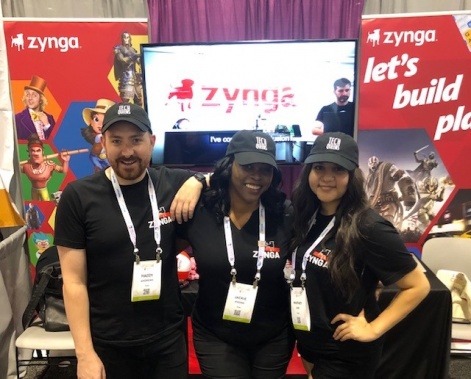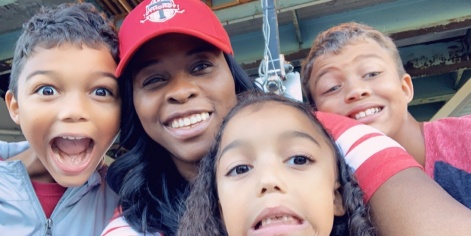For decades, people of colour have suffered through a lack of opportunity and a lack of respect.
The games industry is no different, and here at PocketGamer.biz we wanted to do our part and help bring attention to the many incredible people of colour that help make up this sector.
So, welcome to our 'POC in Mobile' series, where discussion about finding a place in the games industry, the various challenges faced as a minority, and what needs to be done to make games more diverse will be the focal points of conversations.
This week, we spoke to Zynga talent operations manager Keisha Krainer about why recruitment will not able to solve the issue of diversity by itself, as well as why more options should be available to those that are unable to attend college or university.
PocketGamer.biz: Can you start by telling us about your role in games and what it entails?
Keisha Krainer: I am a talent operations manager for the global recruiting team at Zynga. It's a "Jack of all trades, master of none" role and I love it. It gives me the space to learn and improve. I continue to build on my projects which allows me to grow and adapt. I also get to work with amazing people and learn new things every day.
My role includes building the employer brand, as well as implementing recruiting technology, operations and processes. One day I can be creating content for our career site and the next I can be creating process documents, fixing a technology bug, or working on marketing for our Zynga employee resource groups (ZERGs).
Stop pointing fingers, stop leaving solutions to others; we all need to play our part in improving diversity.Keisha Krainer
Sometimes I’m completely outside of my comfort zone, doing things that I never thought I would be allowed to do, yet my team has always been super supportive.
Why did you want to work in the games industry?
I wanted to work in games because I love the culture. It tends to have core values that make you feel like you're creating positive change, such as "connecting the world through games” or “every voice matters”.
Those are not just company statements but have become my mottos for my day-to-day work. It inspires me to find ways to build those connections and to speak up for those who cannot for themselves.
How would you recommend people get started in games? Any tools or literature you would advise?
The best advice I received was to be the best you can be in your field and never give up.
Companies and roles constantly change based on new technology and tools. Use the job description as a guide - not a roadmap. People miss out on opportunities because they do not have all the job description bullets on their resume. You never know unless you try.
If by chance you're rejected, try and find out what skills you are missing. Work on obtaining those skills and never let rejection get to you. Thomas Edison failed more times than he succeeded for example. Work on being the best you can be and the rest will fall into place.
What did you study (if anything) for your role? Are there any courses out there that you would advise for aspiring professionals?
I had a very difficult decision to make between family or school and I did what was best for me and my family, so I was unable to complete my degree. I quit school and started working and taking care of my family's needs but still kept on improving myself by focused on reading, learning and trying to understand how everything in my field connects. Taking free webinars, going to Facebook groups, LinkedIn channels etcetera.

I think getting an education is important but realistically it isn’t always attainable for everyone. If you have the opportunity to go to school, I always suggest researching your field and finding out what the latest and upcoming tools and tech will be, before adding those to your lesson plan.
What do you think should be done to improve diversity, not only across the games industry but across all industries?
Stop pointing fingers, stop leaving solutions to others; we all need to play our part in improving diversity. We should be asking: "What can I do and how can I be better?” - not just when it's popular to so. That's not an easy thing, however, if we all work on opening our minds to this possibility we would be so much farther along than we are.
On top of this, I think instead of only covering racial issues of the past, we should discuss and educate ourselves so we never repeat the same mistakes.
What are the biggest challenges you have encountered since joining the industry?
Learning that I have a voice and when to use it. This not only applies to diversity but making sure that I have a voice in my career. You should be able to ask your manager about a growth plan. If one hasn't been created, ask to work on one that includes your passions.
We need to create more entry positions and programs for people like me, who could not go to college.Keisha Krainer
If your manager is not working with you, use your resources like HR, next-level manager and even research roles on the internet.
What do you think can be done to help encourage more people of colour to get into games?
After 10 years of working in this industry, people are still surprised to find women of color. How is that still a thought? I feel there need for more stories about diverse talents and the different roads taken to get here.
We need to create more entry positions and programs for people like me, who could not go to college. We also need more early talent partnerships with high schools, afterschool programs and colleges in more rural areas to let them know of their options. To know you have options is a powerful thing.
Is there anything that recruiters should be doing differently to address the lack of diversity across not only games development but all industries?
Recruiters cannot solve diversity alone. They can do their best in presenting a diverse talent pool, yet they need assistance from the whole company to be successful - including having employees refer talent.
Since the surge in the #BlackLivesMatters campaign that took place last year, what changes (if any) have you seen from across the industry to address the issue?
Honestly, it was a wake-up call for the industry. It's hard for someone to know what is happening to a group if you are not part of it. Last year shed an important light on people's struggles and challenges.
People are so much more aware of how their choices affect others; how comments, characters, and actions have so much more weight now. Industry leaders are making themselves available to talk to employees to understand their points of view.

Leaders are realising that the playing field is not equal and so they need to make it equitable for all. That alone is a huge change in diversity practices. My only fear is that change takes time. I hope we don't lose momentum or focus on the goals of diversity. It shouldn’t take a tragedy to make meaningful change in this industry.
What advice do you have for other people of colour that are looking at getting into games?
There is always more than one road to reaching your goal. Don’t get so focused on one path that you miss the opportunity with less travel to get you there. If that means working in a different industry to get the experience needed in a certain area, don’t shut that door.
I had the pleasure of working with some amazing art directors and engineers who started in customer service and quality assurance to get their foot in the door. Lastly: never lose hope, always remember your goals, and you only need one person in your corner (you).






















